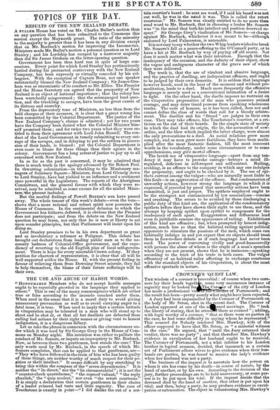TOPICS OF THE DAY.
RESULTS OF THE NEW ZEALAND DEBATE.
A FULLER House has voted on Mr. Charles Buller's motion than on any question that has been submitted to the Commons this session except the Maynooth grant. The ratio of the minority to the majority is greater than it has been in any division except that on Mr. Roebuck's motion for improving the Income-tax. Ministers made Mr. Buller's motion a personal question as to Lord Stanley ; and his Lordship has escaped by a narrower majority than did Sir James Graham on the letter-opening question.
Government has been thus hard run in spite of large con- cessions. Every point for which Lord Stanley has pertinaciously battled during his protracted controversy with the New Zealand Company, has been expressly or virtually conceded by his col- leagues. With the exception of Captain Rous, not one speaker substantially blamed the New Zealand Company; Sir James Gra- ham was as encomiastic of its conduct as Mr. Ellice. The Premier and the Home Secretary are agreed that the prosperity of New Zealand is an object of national importance.; that the colony has been wretchedly misgoverned ; that the mismanaged land ques- tion, and the truckling to savages, have been the great causes of its distress and anarchy.
From the deprecatory tone of Ministers, no less than from the bold charges of their accusers, it is clear that a great wrong has been committed by the Colonial Department. The justice of the New Zealand Company's claims is admitted : yet for two years have the Company been denied what the Colonial Minister him- self promised them ; and for twice two years what they were en- titled to from their agreement with Lord John Russell. The con- duct of the Local Government in tamely submitting to every out- rage of the savages, and in delaying to put the settlers in posses- sion of their lands, is blamed : yet the Colonial Department is even more to blame for these things than their agents in the colony. Government has a long arrear of justice to pay up to all concerned with New Zealand.
In so far as the in is concerned, it may be admitted that there is much truth in the apology advanced by Sir Robert Peel. In thwarting colonization—in truckling to the Missionary ma- - nagers of Salisbury Square—Ministers, from Lord Glenelg down to Lord Stanley, have but yielded to an influence and a sentiment once powerful in the Legislature. The reports of the Aborigines Committees, and the general favour with which they were re- ceived, may be admitted as some excuse for all the misled Minis- ters,ithe present included. But the morbid feelings of Fowell Buxton's rem have passed away. The whole tenour of this week's debate—even the vote— shows that a more rational and robust spirit now possesses the House of Commons. In the sentimental delusion to which the Government has hitherto deferred, it is obvious that the Premier - does not participate ; and from the debate on the New Zealand question, he may learn, not only that he is now at liberty to act upon sounder principles, but that Parliament will insist upon his doing so.
Lord Stanley promises to be in his own department as great and as involuntary a reformer as Polignac. This debate has brought out declarations from leading public men as to the ne- cessary badness of Colonial-Office government, and the expe- diency of reverting to the old English plan of local self-govern- ment. There is hope for every miserable Crown colony. If they petition for charters ofsentation, it is clear that all will be well supported within the House. If, with the present feeling in favour of relieving them from Downing Street misrule, they fail to help themselves, the blame of their future sufferings will be their own.


























 Previous page
Previous page